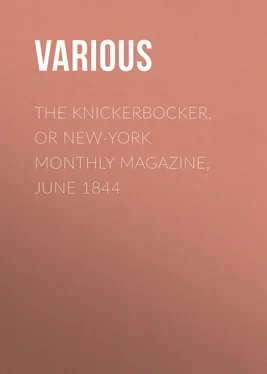Various - The Knickerbocker, or New-York Monthly Magazine, June 1844
Здесь есть возможность читать онлайн «Various - The Knickerbocker, or New-York Monthly Magazine, June 1844» — ознакомительный отрывок электронной книги совершенно бесплатно, а после прочтения отрывка купить полную версию. В некоторых случаях можно слушать аудио, скачать через торрент в формате fb2 и присутствует краткое содержание. Жанр: foreign_antique, periodic, foreign_edu, на английском языке. Описание произведения, (предисловие) а так же отзывы посетителей доступны на портале библиотеки ЛибКат.
- Название:The Knickerbocker, or New-York Monthly Magazine, June 1844
- Автор:
- Жанр:
- Год:неизвестен
- ISBN:нет данных
- Рейтинг книги:5 / 5. Голосов: 1
-
Избранное:Добавить в избранное
- Отзывы:
-
Ваша оценка:
- 100
- 1
- 2
- 3
- 4
- 5
The Knickerbocker, or New-York Monthly Magazine, June 1844: краткое содержание, описание и аннотация
Предлагаем к чтению аннотацию, описание, краткое содержание или предисловие (зависит от того, что написал сам автор книги «The Knickerbocker, or New-York Monthly Magazine, June 1844»). Если вы не нашли необходимую информацию о книге — напишите в комментариях, мы постараемся отыскать её.
The Knickerbocker, or New-York Monthly Magazine, June 1844 — читать онлайн ознакомительный отрывок
Ниже представлен текст книги, разбитый по страницам. Система сохранения места последней прочитанной страницы, позволяет с удобством читать онлайн бесплатно книгу «The Knickerbocker, or New-York Monthly Magazine, June 1844», без необходимости каждый раз заново искать на чём Вы остановились. Поставьте закладку, и сможете в любой момент перейти на страницу, на которой закончили чтение.
Интервал:
Закладка:
Many of the prisoners busied themselves in making some trifling article, which, while it afforded amusement, aided in obtaining for them a little money, and thereby added to their comfort. Many of the most ingenious specimens of art I ever saw were made there; some of which were models of vessels, of various classes, from the clipper-built brig to the line-of-battle ship; made too of beef bones, obtained from the cook. They were built up precisely like a large vessel; human hair twisted into ropes of suitable sizes being employed for rigging. When completed, they made a beautiful toy. Desks, work-boxes, etc., were also made here; violins, some of which were of excellent tone, were likewise constructed. But it would be useless to enumerate the endless variety of queer things made at this multifarious manufactory. Some organized a music-society, with various instruments, and used occasionally to give concerts; others got up a theatre, screening it off with bed covering. I recollect some pretty good performances among them. In short, all were employed in some way, to divert their minds from the contemplation of their miserable condition. Some would read while others listened; some practice fencing; some sing, some dance. Others would relate their adventures, many of which savored rather too strongly of the marvellous to be readily believed, while others partook in an equal degree of the ludicrous. One of these latter was related by ‘Old John Young’—a tale of his early courtship. In his youthful days he lived somewhere in Pennsylvania, where also resided an old farmer, with his wife and two daughters, one of whom, contrary to the old gentleman’s wishes, he used to visit. One night while there, unknown to the old people, they having retired, a huge pot of mush was left boiling over the fire, getting ready for the next day. Late in the evening the old gentleman called out for the girls to go to bed; and as they did not retire in time to suit him, he began to stir round, to see why his orders were not obeyed. Young, hearing him coming, took off his shoes to prevent a noise, and glided silently up a ladder into the loft above. The old farmer, having sent the girls to bed, lifted off the boiling pot, which by accident he placed at the foot of the ladder; then putting out the light, and covering the fire, he retired again to bed. When all was still and quiet, Young, with shoes in hand, stole down the ladder, and landed in the pot! Although badly burned, he escaped in some degree by having his stockings on. He left his tracks on the floor, but got out of the house unobserved. He had ‘put his foot in it’ in good earnest; and mounting his horse, he bade a final adieu to the old farmer and his family.
Winter was now pretty well advanced, and many suffered for the want of clothing. After considerable delay, however, a small portion was sparingly dealt out, but was accepted by those only who stood in the utmost need. The cause was, that the agent or contractor, having a quantity of garments on hand, over what had been a sufficient supply for some English convicts, who had been confined here at some former period, they were now offered to us, but were rejected by all who could do without them. Those who did receive them, cut a curious figure! I can almost imagine one standing before me now, dressed in a jacket and trowsers of bright yellow cloth; and as they were served out indiscriminately, the consequence was, that large stalwart men were crammed into trowsers which looked more like breeches, and jackets with sleeves terminating at the elbows; and small men with jackets, the sleeves of which dangled far below the hands, and an extra length of pantaloons turned up to the knees; the whole figure surmounted by a knit-woollen cap, resembling an inverted wash-basin; coarse brogans completed the costume. Just pause a moment, reader, and contemplate the figure!
What with starving and freezing, many became ill, and had to be removed to the hospital. This was what all dreaded; and the consequence was, they were so far gone before they went, that they survived but a short time after getting there, although it was understood that the physician was a skilful and humane man, and did all in his power to alleviate their distress. I was taken very ill with the dysentery. I know of no disease which brings a man down more rapidly. Two or three days weakened me so much that I could scarcely move; and with it came a despondency of mind that was almost insupportable. I had been for years a wayfarer in strange lands, but never, during the whole time, did I so forcibly feel the want of a home, and the solace and care of friends, as now. How did I long to be once more under my father’s roof, with an affectionate mother and kind sister! I had a sad forboding that I should soon be numbered among the multitude whose spirits had ascended from their prison-house, and whose bodies were deposited outside the walls, in the ground assigned for that purpose.
The small-pox had also appeared in our midst, spreading havoc on all sides; and despair seemed to rule triumphant. Of those who left for the hospital, but few returned to their comrades. Among those taken ill, was a young man who had been brought up on a farm. Like many others, he had left home to ‘go a-privateering,’ and was taken prisoner. He never saw home again. He messed just opposite to me, and was I think one of the most exquisite amateur performers on the violin that I ever heard. For hours have I listened with rapture to his delightful music. He was absent a day, and his instrument was silent. The next day I enquired for him; he had been taken suddenly ill, was removed to the hospital, and the second evening brought me tidings of his death. There was another one, who had been for weeks sullen and gloomy. Despair seemed to have thrown its pall over him. He conversed with none, but shunning his companions, spent the day muttering to himself. Early one morning he was discovered in a secluded part of the prison, cold and stiff. He had hung himself.
And was there no one to look after the spiritual or temporal welfare of this mass of isolated beings? Was there none to soothe the troubled mind, to cheer the drooping spirit, nor to whisper hope in the ear of the desponding? Was there none of God’s ‘messengers of glad tidings’ to offer consolation to the dying, and a prayer for mercy on the departing spirit of his suffering fellow-being? No; not one minister of the gospel, of any denomination, did I see while I was there; nor did I hear of any having been there, at any time; nor was there any person to see that the prisoners had suitable beds and clothing, or that their food was wholesome, during the many months that I was there. I was told that Reuben G. Beasly, who was appointed by our government, and who received its pay to see to American interests, had been there some months before, but had done nothing for them; and to the letters of remonstrance written to him, stating their wants, their insufficiency of food and clothing, etc., he turned a deaf ear. He did not deign a reply to them; and what more could be expected of a man who could be so base as to do what I will here state?
About three years ago I met an old ship-mate. We went to India in the same ship. He held a midshipman’s warrant in the United States’ navy, and went out on this voyage for practice in seamanship. He was made prisoner at the same time I was. In the shiftings and changes which took place, we were separated; and when I saw him, several years after, he stated that after parting with me he remained in London, endeavoring in vain to get employment on board some ship; that becoming destitute, he went to Mr. Beasly, ( Beastly it should be,) to get advice and assistance, stating who and what he was; and that, in consequence of the unsettled mode of life in which he had been living, he had unfortunately lost his warrant; and urged him, as an act of humanity, to point out some method whereby he might help himself. He turned away from him with indifference, saying he could do nothing for him. After a lapse of several days, finding no hope of extricating himself from his embarrassed situation, as a last resource he went once more to Mr. Beasly, and asked assistance. The reply was: ‘Be off! and if you trouble me again I will put you on board of an English man-of-war!’ This gentleman 1 1 Stephen B. Wilson, Esq.
is now Lieutenant Commandant in our navy. He told me he had seen Mr. Beasly not long before, in his official capacity as consul at Havre, but did not make himself known to him. Is it not strange, that one who was so regardless of the duties of his office and the feelings of humanity should hold so lucrative and responsible a situation as the one which he enjoys to this day? There have been serious complaints made against him, within a year or two, by several respectable captains of vessels.
Интервал:
Закладка:
Похожие книги на «The Knickerbocker, or New-York Monthly Magazine, June 1844»
Представляем Вашему вниманию похожие книги на «The Knickerbocker, or New-York Monthly Magazine, June 1844» списком для выбора. Мы отобрали схожую по названию и смыслу литературу в надежде предоставить читателям больше вариантов отыскать новые, интересные, ещё непрочитанные произведения.
Обсуждение, отзывы о книге «The Knickerbocker, or New-York Monthly Magazine, June 1844» и просто собственные мнения читателей. Оставьте ваши комментарии, напишите, что Вы думаете о произведении, его смысле или главных героях. Укажите что конкретно понравилось, а что нет, и почему Вы так считаете.












